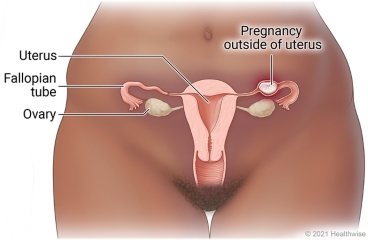
Overview
An ectopic pregnancy occurs when a fertilized egg grows outside of the uterus. In a normal pregnancy, the fertilized egg grows inside the uterus.
In most ectopic pregnancies, the egg grows in a fallopian tube. This is also called a tubal pregnancy. Sometimes the egg grows in an ovary or some other place in the belly. But this is rare. An ectopic pregnancy never becomes a normal pregnancy and birth.
You were given a medicine called methotrexate to treat your ectopic pregnancy. This was done to prevent dangerous problems. After your treatment, you may have vaginal bleeding that's like a period. It may last for about a week. You may have belly pain that lasts a few days. The pain may get worse for a day or two about a week after treatment.
Treatment with methotrexate can be complex. It may involve a number of blood tests and doctor visits over the next several weeks.
This treatment usually works well. But there is still a chance that you will need surgery.
You should be able to have a normal pregnancy in the future. But you may have a higher risk for more ectopic pregnancies. Tell your doctor right away if you get pregnant again.
Follow-up care is a key part of your treatment and safety. Be sure to make and go to all appointments, and call your doctor if you are having problems. It's also a good idea to know your test results and keep a list of the medicines you take.
How can you care for yourself at home?
- Your doctor might want you to use sanitary pads if you have vaginal bleeding. Using pads makes it easier to keep track of your bleeding. You may use tampons during your next period. It should start in 3 to 6 weeks.
- Ask your doctor when you can have vaginal sex again.
- Get plenty of rest. You may be more tired than normal for a few weeks.
- Avoid moving quickly or lifting anything heavy until your doctor tells you it is safe to do your normal activities.
- Follow your doctor's instructions about taking over-the-counter pain medicine, such as acetaminophen. Don't take NSAIDs like ibuprofen or naproxen. Read and follow all instructions on the label.
- Do not take two or more pain medicines at the same time unless the doctor tells you to. Many pain medicines have acetaminophen, which is Tylenol. Too much acetaminophen (Tylenol) can be harmful.
- Do not drink alcohol.
- Avoid foods that may give you gas, such as beans, broccoli, cabbage, and apples.
- Do not take vitamins that contain folic acid, such as prenatal vitamins.
- Avoid direct sunlight. It can cause skin problems while the medicine is in your body.
- Pay attention to your feelings. If you're sad and it's not getting any easier, talk with your doctor or a counselor.
- Talk to your doctor if you want to try to get pregnant soon. The doctor can tell you when it's safe to do so.
- If you don't want to get pregnant, ask your doctor about birth control. It's safe to use it during your treatment. It's possible to get pregnant again before your next period starts.
- Go to all follow-up appointments and tests. This helps your doctor make sure that your treatment is working.
When should you call for help?
Call 911 anytime you think you may need emergency care. For example, call if:
- You passed out (lost consciousness).
- You have severe vaginal bleeding. This means that you are soaking through your usual pads every hour for 2 or more hours.
- You have sudden, severe pain in your belly or pelvis.
- You feel you cannot stop from hurting yourself or someone else.
Where to get help 24 hours a day, 7 days a week
If you or someone you know talks about suicide, self-harm, a mental health crisis, a substance use crisis, or any other kind of emotional distress, get help right away. You can:
- Call the Suicide and Crisis Lifeline at 988.
- Call 1-800-273-TALK (1-800-273-8255).
- Text HOME to 741741 to access the Crisis Text Line.
Consider saving these numbers in your phone.
Go to 988lifeline.org for more information or to chat online.
Call your doctor now or seek immediate medical care if:
- You have a fever.
- You are dizzy or lightheaded, or you feel like you may faint.
- You have new or worse pain in your belly or pelvis.
- You have vaginal discharge that smells bad.
Watch closely for changes in your health, and be sure to contact your doctor if:
- You do not get better as expected.
Where can you learn more?
Go to http://www.healthwise.net/patientEd
Enter E123 in the search box to learn more about "Treating an Ectopic Pregnancy With Methotrexate: Care Instructions".
Current as of: July 10, 2023
Author: Healthwise Staff
Clinical Review Board
All Healthwise education is reviewed by a team that includes physicians, nurses, advanced practitioners, registered dieticians, and other healthcare professionals.

